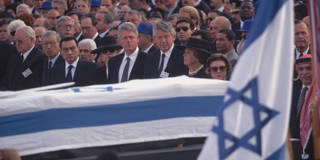Those urging Ukrainian President Volodymyr Zelensky to negotiate with his Russian counterpart may be doing so because they genuinely want to end the bloodshed. But, just as the war carries a high price, so would peace with Russia – not least for whomever negotiates it.
MOSCOW – “Blessed are the peacemakers,” Jesus of Nazareth tells his followers in the Sermon on the Mount, “for they shall be called sons of God.” Whether those who dare end brutal conflicts enjoy great rewards in heaven, as the sermon promises, is impossible to know. What is clear is that, here on Earth, peacemakers often pay a heavy price – often their lives – for their efforts.

MOSCOW – “Blessed are the peacemakers,” Jesus of Nazareth tells his followers in the Sermon on the Mount, “for they shall be called sons of God.” Whether those who dare end brutal conflicts enjoy great rewards in heaven, as the sermon promises, is impossible to know. What is clear is that, here on Earth, peacemakers often pay a heavy price – often their lives – for their efforts.